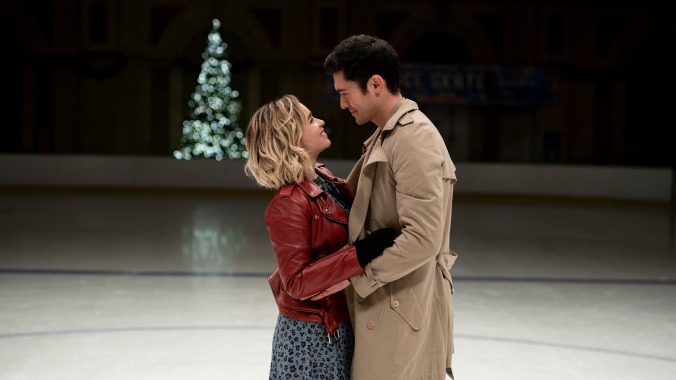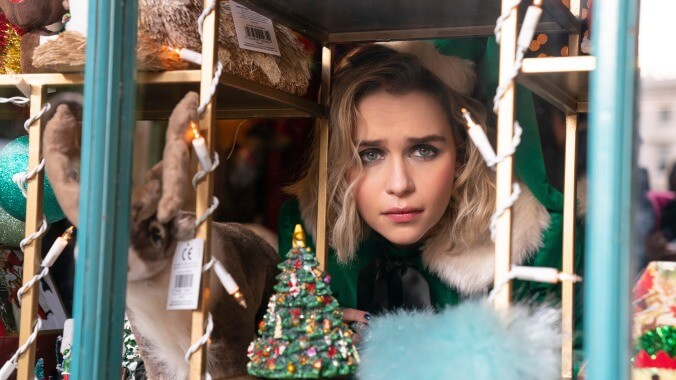A coal-lump twist can’t dampen the fleabaggy charms of Last Christmas


There’s no spoiling the new Yuletide-themed rom-com Last Christmas; its script and advertising, plus the broad contours of its premise, all beat the press to that particular punch. Imagine, if you will, a film taking its title from erstwhile Wham! frontman George Michael’s signature holiday standard, a song that even the barely pop-culture-literate can remember starts with a sweetly glum “Last Christmas / I gave you my heart / the very next day / you gave it away.” Imagine that its story takes place around late December, and revolves around a woman who received a complete heart transplant one year earlier. Imagine that her romantic opposite keeps doing odd things like dodging passersby on the sidewalk, or never speaking to anyone but her, or vanishing and materializing without warning. A viewer doesn’t need to possess the deductive skill of an Encyclopedia Brown to get to the bottom of what’s going on here.
Like a serial killer taunting the local police with cut-and-paste letters, Emma Thompson’s script (dreamt up with her husband, Greg Wise, then co-written with Bryony Kimmings) gives the perverse impression that it wants us to figure out its game. Fortunately, the rom-com genre and its emphasis on immediate scene-to-scene pleasures—stunning metropolitan scenery, crackling conversation, symmetrical faces—make the hackneyed, spectral elephant in the room easy enough to discount. It’s a glaring misstep, one most likely destined to be the public’s identifying detail as the film fades from memory. (“Say, wasn’t that the one where he was a [REDACTED] the whole time?”) But one misdeed does not consign a person to the naughty list, and one chestnut-headed twist can’t tank this otherwise winning trifle.
That’s the general idea, that a person’s not defined by the worst part of themselves, as we take an inventory of the soul for rudderless screwup Kate (Emilia Clarke). Her introduction, smash-cutting from pints to a hungover morning after in a stranger’s flat, promptly establishes her as a hearty drinker with inadvisable taste in shagmates. She’s unreliable, both as a friend prone to carelessly destroying the possessions of those generous enough to put her up, and an elf half-heartedly working for Santa (Michelle Yeoh, treated humanely) at her knick-knack shop. The singing career she imagined as a child in the former Yugoslavia hasn’t taken off like she thought it would, and London’s audition circuit has her feeling discouraged… until she meets the dashing, hard-to-contact Tom (Henry Golding), of course. Throw in a contentious family dinner with a hypercritical mother (Thompson, putting on an exaggerated Easter European accent) and a bitter-rival sister (Lydia Leonard), and she’s one anal-sex gag away from Fleabag territory.
The Waller-Bridge touch, serviceably replicated with Thompson’s blue dialogue (well, light blue, cerulean at the darkest) and the timing-is-everything direction of Paul Feig (Spy), represents just one in a handful of globally understood Britishisms inserted into the background. That’s literal to an extent, with landmark location shooting around the bridge and Brick Lane sure to delight Anglophiles while eliciting eye rolls from actual Londoners. The cameos favor the BBC set, whether it’s Peter Serafinowicz, one of the Great British Bake-Off judges, or Patti LuPone on loan for the afternoon between previews of Company in the West End. There’s an obligatory bit of Brexit business as well, half-assed and perfunctory though it may be, as Kate offers a kind ear to two random immigrants never to be seen again after a Leave voter harasses them. Why tarnish the warming artifice with intrusions from the real world?
As escapist comfort-food cinema goes, this is a stick-to-your-ribs, tryptophan-coma-size helping. Golding summons the same cozy-handsome appeal that bolstered Crazy Rich Asians to make a character textually lacking in any interiority whatsoever into a watchable presence worth our emotional investment. But it’s Clarke who shines, her eyebrow-first acting style having finally found a context that suits it. She mounts a persuasive argument for herself as a movie star in a post-Game Of Thrones world, sharpening the edges of the traditional flibbertigibbet to a point. And she succeeds in the only real meaningful test of rom-com skill, in that she makes us want her to be happy.
Perhaps the big, hilariously predictable element near the end of Kate’s Dickensian path to self-betterment casts everything before it in a more flattering light. But Clarke and Golding earn the shameless sentimentality of their odd quasi-courtship, doubled as it is by the spirit of Christmas. Though the word “shame” really has no place at all in this winter wonderland. It’s a guilty pleasure nobody has to feel guilty about indulging in.